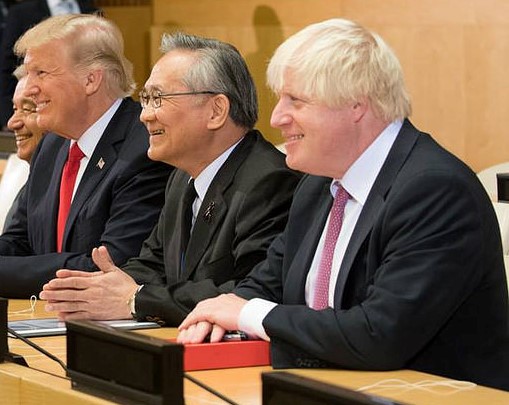Donald Trump: A universal scapegoat for cynical politicians
By Khaled Diab
Donald Trump is possibly the worst American president in history, but that does not give the rest of the political establishment a get-out-of-jail-free card when it comes to taking responsibility for the mess the world is in

Wednesday 13 December 2017
While former US President Barack Obama regularly signalled that the “buck stops here”, even for matters that were not directly his responsibility, his successor, Donald Trump, lobs the buck way over there to escape responsibility, even for his own direct actions.
Even though Trump's tendency to blame the political establishment for everything is legendary, less well-known are other politicians' and leaders' inclination to blame everything on Trump. This was visible in the tidal wave of criticism Trump received for his decision to recognise Jerusalem as Israel's capital and his plans to move the US embassy there. Although this has been US law since 1995 and numerous presidents have campaigned to do just that, Trump has been accused of single-handedly destroying the ‘peace process', which has been defunct and deceased since its birth, if not its inception, and undermining America's role as an ‘honest broker', as if Washington was ever impartial.
Another jarring example was the unexpected transatlantic spat with the UK sparked by Donald Trump's decision to retweet propaganda videos shared by the fringe far-right group Britain First.
Condemning Trump's implicit endorsement of Britain First, which Theresa May slammed as “a hateful organisation,” the British premier said the extremist group “stands in fundamental opposition to the values that we share as a nation – values of respect, tolerance and, dare I say it, common decency.” Foreign Secretary Boris Johnson echoed his boss's sentiment, calling Britain First “a divisive, hateful group whose views are not in line with our values”.
Invoking the UK's “proud history as an open, tolerant society”, Johnson emphasised that “hate speech has no place here”.
The sheer and breathtaking audacity and hypocrisy of this statement will immediately strike anyone who has followed, even cursorily, Boris Johnson's almost peerless ability to offend people around the world, including his offensive claim that Libya offered great investment opportunities once they “clear the dead bodies away”.
Although wittier with a manufactured bumbling affability, his persona as dishevelled as his blonde mop of hair, Boris Johnson has much in common with Donald Trump. Both the sons of privilege, their political careers rest not on any political achievements but on their popular media personas. In the case of Johnson, his regular appearances on the popular satirical show Have I Got News For You and his widely read column propelled him into the Tories' political A list.
Long before Donald Trump became a leading advocate of the anti-Obama birther movement and officially inaugurated the era of “post-truth” and “alternative facts”, Boris Johnson is credited with inventing EU-related fake news. “He turned euro-scepticism into an art form,” a former colleague recalled. “Boris campaigned against the cartoon caricature of Brussels that he himself invented.”
Despite the very strong likelihood that Trump will live up to people's expectations of becoming (one of) the worst American president(s) in history, he has yet to accomplish an act of collective national self-harm quite as suicidal as the cynical Johnson-led Brexit movement.
Johnson and May's appeal to tolerance, openness and respect ring even hollower considering how much they and their party have undermined these values, from May's infamous disparagement of the almost half of the British people who regard themselves to be citizens of the world, to the growing tide of xenophobia threatening refugees, migrants and even EU citizens in Brexit Britain.
On the other side of the Atlantic, a similar dissonance exists amongst the conservative political establishment. It is almost as though history both ended and began with Donald Trump. This is clear in the rehabilitation of the former worst American president, George W Bush, who has recently been receiving fawning media coverage for his (veiled) criticism of Trump. Without naming Trump, Bush accused the sitting president of promoting bigotry, fuelling intolerance, undermining democracy and spreading falsehood. “Bigotry seems emboldened. Our politics seems more vulnerable to conspiracy theories and outright fabrication,” Bush rebuked.
For those of us who lived through the Bush years, this is very much a case of the pot calling the kettle black, with the main exception being that Bush was not a racist – at least not by the standards of his party. “Bush paid lip service to rights and norms before crushing them underfoot. Trump is more brazen in his language and more candid in his intent,” wrote the prominent author and journalist Gary Younge.
Despite defending diversity rhetorically, Bush and his administration were not beyond using prejudice and paranoia as tools of governance or weapons of mass distraction, even deception. They exploited the post-9/11 atmosphere of fear and anger to trample on civil liberties at home, to co-opt the media, to intimidate or silence opponents, and to launch two large-scale military invasions and occupations (in Afghanistan and Iraq) that killed hundreds of thousands, destabilised the Middle East, and effectively bankrupted the United States.
In order to achieve this, the Bush administration spread exaggerated misinformation and patently fake news, such as Iraq's non-existent WMD arsenal, and browbeat allies and enemies alike, with polarising talk of “you are either with us or against us” and the infamous “axis of evil”, which inexplicably placed Baathist Iraq in the same camp as its arch enemy, the Islamic Republic of Iran. In the process, the Bush administration squandered the tidal wave of global goodwill and sympathy towards the United States in the wake of the 9/11 terrorist attacks.
This makes the fact that the conservative resistance against Trump is being led by former Bush administration figures seem extremely ironic. One of the loudest such critics is Bush's former speech writer, David Frum, the man who coined the axis of evil and wrote a glowing biography of the former president, who is now a senior editor at The Atlantic.
It is not just neo-conservatievs and the Republican establishment who are failing to search their souls and introspect, the Democratic party's mainstream are also falling short in that mission. While they obsess over the extent of Russian subterfuge and meddling, they ignore their own role in creating the groundwork for the toxicity overtaking Washington. This includes choosing the status quo of Hillary Clinton over the genuine change offered by Bernie Sanders, the decades of support for destructive neo-liberal economics, and the failure to push for the reform of America's authoritarian two-party system and outdated electoral colleges, which saw Clinton win the popular vote but lose the election.
None of this is to understate the threat Donald Trump poses to America and the outside world. But just because he is the villain that does not automatically make all his opponents and critics heroes or even innocents.
—-
This is an updated version of an article which was first published by Al Jazeera on 6 December 2017.


